You Monster! Decision-Based Morality, Player Agency, and Guilt
We are the sum of the choices we make
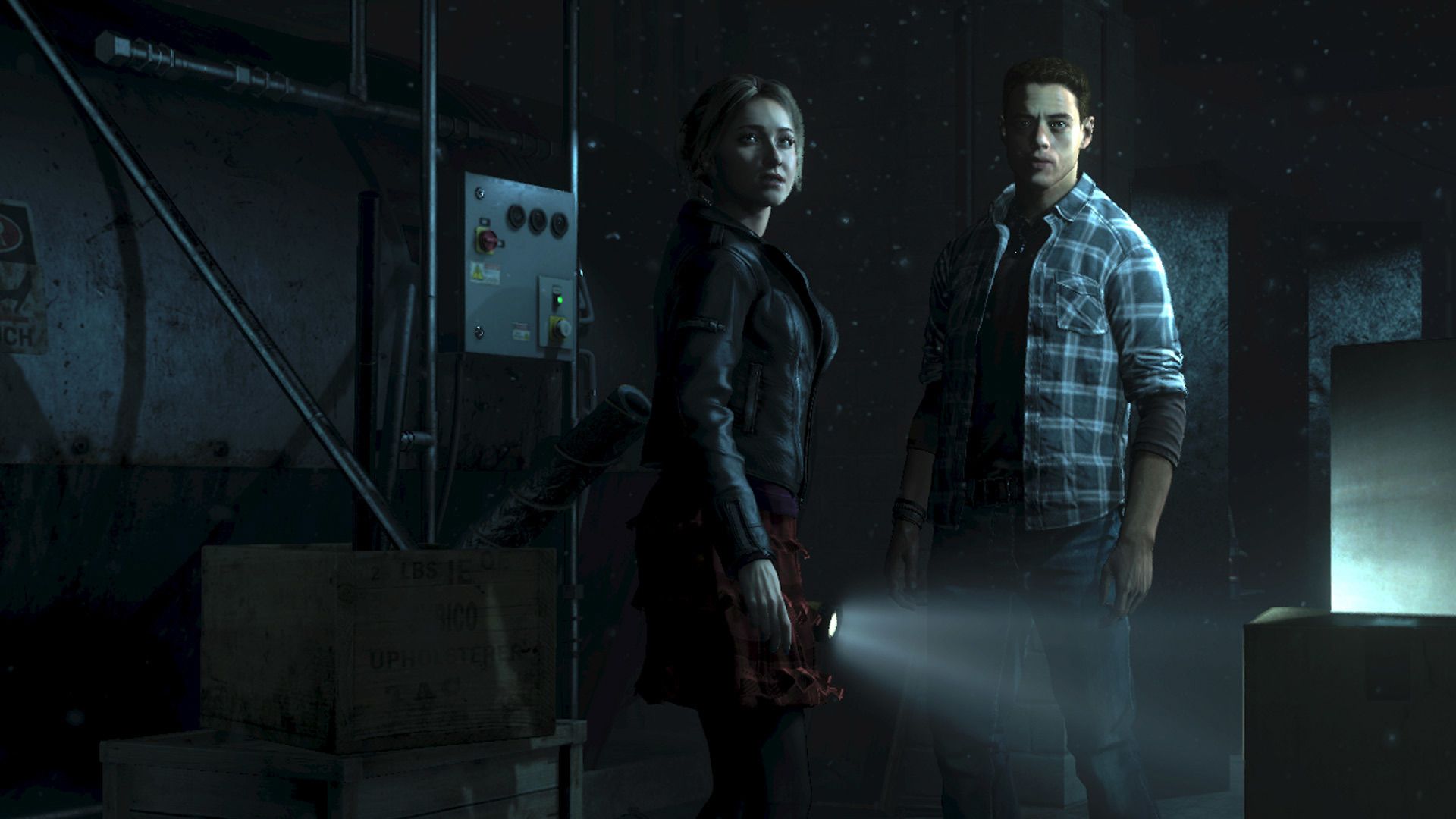
"What if we don't do anything?"
I asked this aloud as my partner and I sat in the dark playing through the choice-driven narrative horror game Until Dawn, confronted with the option to either shoot ourselves or a friend. Two spinning sawblades slowly descended from overhead, a terrible and timely threat to the would-you-rather. We, as the character Chris, had to make a quick decision in the midst of the grind of rusty machinery and pleas for mercy from said friend, Ashley. We had only one hand free to pull the trigger.
I'd recalled seeing something earlier in what the game calls "totems", items that portend potential choices to better equip the player with clues on how to survive the game's various gruesome scenarios. In it I saw Chris putting the gun down on the table between them, choosing to shoot neither himself nor Ashley and I thought, naturally, by staying my hand as the player it would result in a truce against the cruelty of the game.
Nope. Apparently, they both died.
Until Dawn's main story plot following the teens/20-somethings in their remote winter cabin is interposed by sequences of a mysterious and increasingly unhinged man interviewing you, the player. After refusing to pull the trigger we cut to one such intervention, and our interviewer immediately turned to the screen and shouted out how much of a monster we were. It was aimed at another character – the one presumably pulling the strings and the subject of the interviews – but it felt pushed through as an accusation of the player, and I laughed at the irony of how my confidence in neutrality had resulted in a double death.
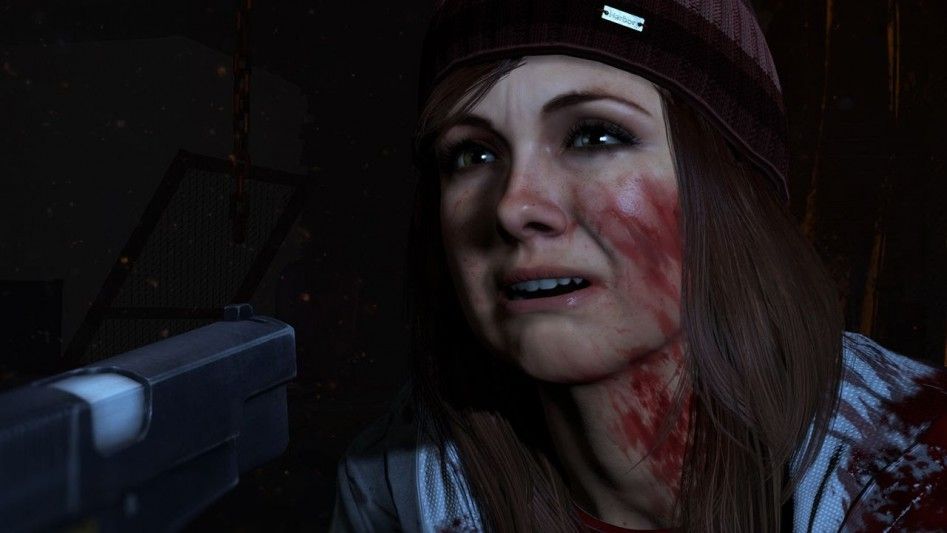
The situation is circumvented later in the game (and it ended up being a good choice to abstain – Chris and Ashley don't actually die), but in the moment it felt horrific that a clement gesture would result in such a terrible ending for two characters. This isn't the first time I've assumed the more ethical choice would yield the better outcome, as there was a particularly stirring decision in Detroit: Become Human that levied the player character's noble kindness against a more selfish act of desperation. And – surprise – the act of selfishness wins you survival.
The importance of choice
Until Dawn is a horror game, so the shocks, scares, and terrifying situations are part of the appeal. But there was a reason I never liked the Saw movies, and it was the inherent cruelty of the premise. I've grown to love horror and embrace the occasional campy slasher film, but where was the fun in watching someone rig games for pointless, serious torture? Why? I always thought. Why do this? I suppose that's half the point, but as an ex-lover of true crime (man, that stuff is just too dark), I find the genre unappealing to witness. Squid Games and Hunger Games went so far as to skewer the entire enterprise (Hostel did too, but it's decidedly part of the more exploitative "torture porn" bracket, however ruminating the commentary might be), framing the voyeurism of pain as a pastime of the privileged, which is something of a truth. Now I'm definitely not the one to extol the virtues of abstaining from fictional recreational violence, as it's really a matter of taste. Life is rough. You gotta pick your poison.

Until Dawn explores its horrific events with an actualization of agency – something that movies don't provide. You aren't a bystander but an active participant. It builds upon the "Final Girl" foundation of later slasher films, something a film studies teacher of mine said marked an evolution in POV for the genre. They proposed that female victims had become the characters for which a largely male-centric audience had to root, shifting identity from the viewpoint of "killer" to "prey" and forcing viewers to reconcile with why they watched in the first place. Was it the joy in suffering, or the release in rescue?
Much like Detroit: Become Human's branching pathways, Until Dawn's "butterfly effect" system offers a fascinatingly diverse network of choices that compound into "cause and effect"-type scenarios. The game boasts over 100 different potential endings, where the smallest of dialogue options or delayed reactions to quick-time events can affect the outcome. The game also plants clues around that help slowly unmask the true plot and aid in your choices, and some of these snippets are extremely important to remember during pivotal parts of the story. It helps that its threats feel truly horrifying and multifarious, creating a sense of paranoia and unreality. The game does frame mercy or kindness as the "winning" option, as that's the natural default of most people looking to save the characters, but you can also make colder decisions, which the game sometimes eggs on by making some of its characters insufferable.
My partner and I investigated this type of characterization as potentially being a red herring, or that the "meanness" was being used as a way to manipulate the player's inclinations to mercy. There was one character, Emily, who constantly ragged on her boyfriend, Matt, in a way that felt purposefully spiteful and like a meta-commentary on annoying female characters. The same goes for couple Mike and Jessica – the latter of whom asks for frequent favors without a single thank you. When push came to shove and they were screaming for help under threat of death, I still wanted to save them, but boy did the game make it obvious that it was challenging your instincts to do so.
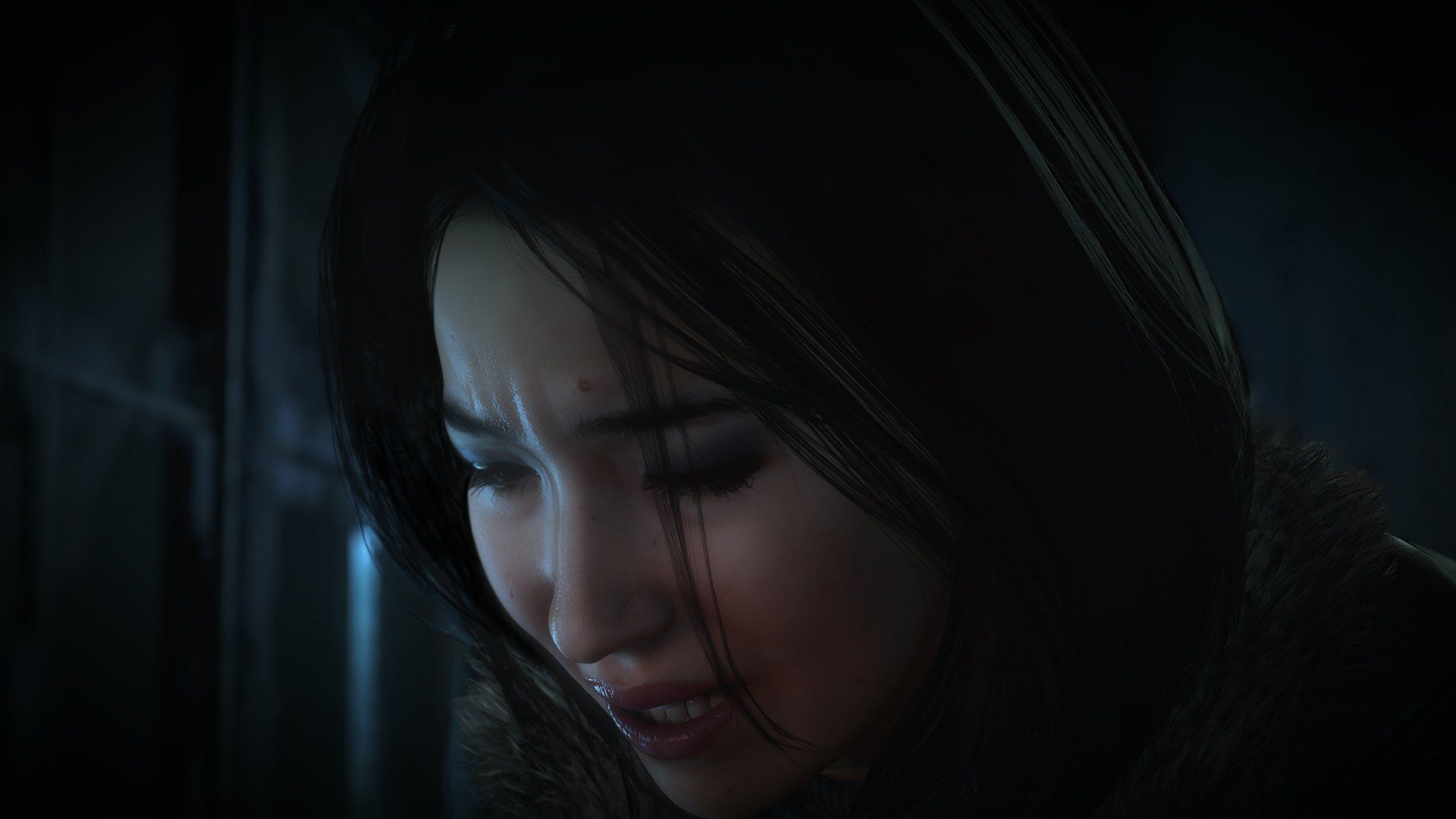
Maturity has something to do with this too. Far removed from being a teenager, I developed a soft spot for even the rudest among them, reconciling their rebellion as the byproduct of a youthful spirit. Knee-jerk judgments became thoughtful evaluations of motivation. Kudos to the Supermassive Team, who made even the harshest characters likable in the end – if only because it's hard to watch even those we dislike suffer. But due to the slasher B-movie nature of the game, there was always a slightly humorous inclination to stop taking it so seriously and just leave their ungrateful butts for dead. I might in a future playthrough, but I'm not keen to go back and purposefully engineer their deaths.
Which is weird, because I didn't always care so much about my NPCs.
Exploring boundaries
When I was a kid, playing the Sims was all the rage. This was a world in which you fashioned the looks, lives, and moral compasses of characters and effectively played God. You could be a kind God, in dominion over a beautifully designed house and carefully curated drama, or you could be a cruel God. I skewed towards the latter and often wondered in my adulthood why I was so interested in offing my Sims or finding weird ways to annoy them as a kid when I was so averse to violence and dickery elsewhere. Friends and I would make the worst-looking creations possible and set them free in a luxurious house – taking it seriously, for a short while – until, giggling like tiny devils, we let something go terribly wrong.
Finding humor in our Sims dying reeks of hypocrisy considering how much I detested violent films and pretty vocally lambasted them for being cruel. I'd say that and then go on my merry, murderous Sims stints. I was a pre-teen when I played, which is a terrifying prospect in and of itself, and so happily embodied the role of heartless deity without realizing this. I can't really say why I was emotionally okay with one but not the other, but I think it has to do with the slapstick nature of death in the Sims, making it more palatable to explore.
I told Adam [Adam Lobel, researcher at GEMH (Games for Emotional and Mental Health) Lab in the Netherlands] that my passion for killing Sims conflicted with my highly sensitive nature, where I tend to become depressed after seeing a sad movie. Adam explained that The Sims was likely a way for me to experiment with a side of myself that was foreign to my core personality traits. In other words, breaking my own personal boundaries – which chimed when I talked to my Facebook respondents, like my friend Will from Melbourne, who said he didn't necessarily enjoy offing his Sims, but wanted to see what would happen within the confines of the game. – Why Did We All Want To Kill Our Sims? by Kristen Cochane
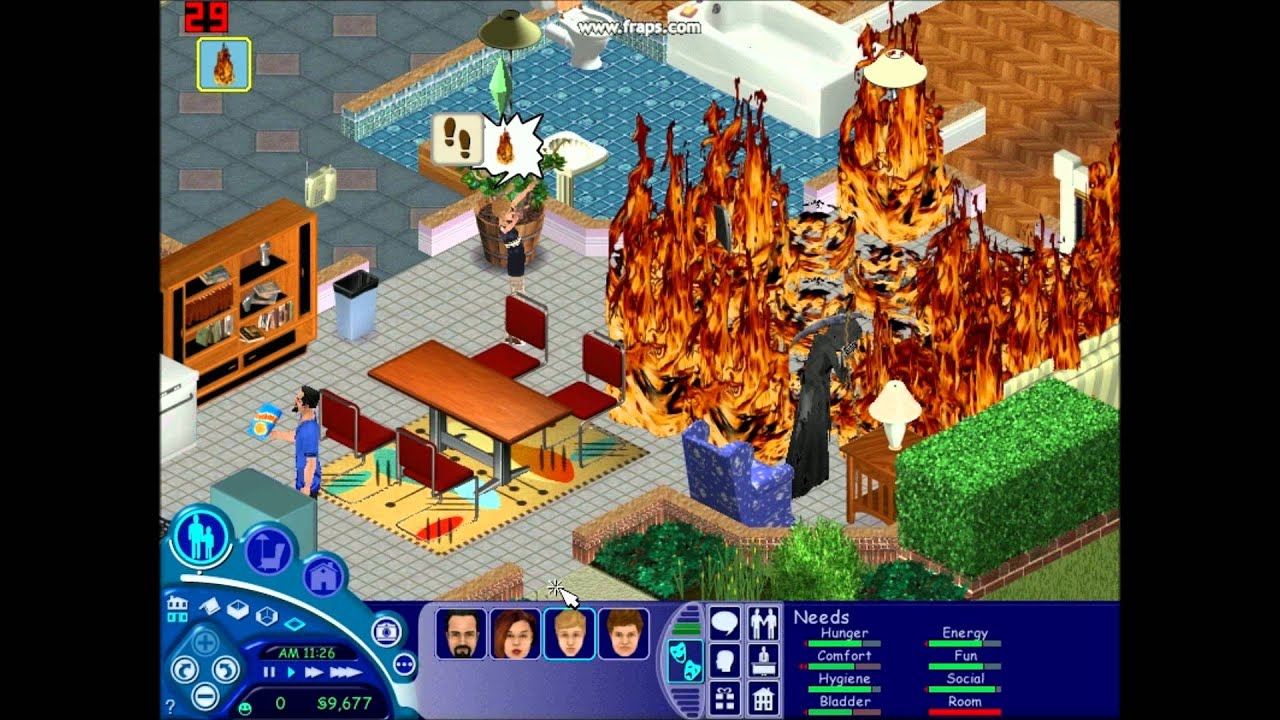
Deaths in the Sims could trigger the appearance of the Reaper, who you could barter with, potentially resulting in the zombification of the late Sim in question, who'd hang out, ghoulish but otherwise normal, the rest of the game. There was also a Tragic Clown who pretty much just sobbed and wandered morosely about your house until you got happier. You could bully him. There was an aspect of power to it all, certainly, but the game seemed to take nothing seriously by design, and so neither did I.
And it wasn't all death – often I'd simply make my Sims walk into a room for no reason in the middle of a task, frustrate them with weird decorations around the house, remove the toilets from a party, try to seduce NPCs, wake them up in the middle of the night to make food, or create a room entirely of stoves. The Sims often had random events, such as alien abductions, that transpired even if you were playing for keeps. The cartoonish physicality of the Sims along with the generally funny audio, sound design, and NPC actions created an environment ripe for emotional experimentation. It wasn't like watching a Saw movie, where violence was a cruel manipulation presented realistically – it was watching Wile E. Coyote get consistently squashed by anvils, often with a slow-blinking resignation to his fate. I would make my Sims so unappealing, so pathetic, so off-putting, that sometimes the game just relented to their demise, free of interference.
Much like launching your little six-bit Roller Coaster Tycoon riders into fiery oblivion after a turn on the most hellish coaster imaginable, the game commences as usual after you commit your atrocities. There are no penalties, really, except that in RCT your park's rating will be lowered and your attendance will decrease. In The Sims, you're merely left to preside over an empty house, watching NPCs peer in windows, mail pile up, and flies buzz about the refuse. It's sordid but uncaring, and so your choices to be awful never butt up against anything uncomfortably evocative...until they do.

The Sims doesn't measure your morality, but there were instances where I began to steer myself in certain directions. I created moral boundaries, and they became fairly inflexible. I distinctly remember one time I built four walls around someone just to see what would happen. I watched with increasing guilt as they had an accident and as the family members walked around frantically trying to find the source of the crying. This was a litmus test of my cruelty because there was a snap-moment in which I felt so bad, so horrified at what I'd done, that I deleted all the walls and freed that little Sim. It completely changed how I played the game. As Nietzsche's saying goes – if you gaze into the abyss, the abyss gazes also into you. I guess, occasionally, we just make our own abysses.
This sandbox-style is in stark contrast to a game like Until Dawn or Disco Elysium; wherein the consequences of your chaos are self-reflective and participatory. In The Sims, these actions don't affect a narrative unless you create one. You've simply constructed a scenario, fulfilled a curiosity, and scrubbed the canvas clean. This is something done more graphically in the Grand Theft Auto games, even though they have a story mode. These kinds of "mean play" experiments became a staple for the chaotically curious, and the popularization of GTA was thanks to that devil-may-care disregard. It reminds me of Sweet Tooth in Twisted Metal, who gleefully and capriciously murks people with the detached nonchalance of plucking a weed. There's a vicious hilarity to his wanton destruction, played for laughs in the show by the inimitable Will Arnett. When you subsume humor with violence, it allows players to exert power without a price.
"...why we play violent video games could be similar to some of the reasons we play sports. At their core, they’re a way to manage aggressive behaviour and our innate drive for competition in a socially acceptable manner. 'Violent video games help explore our fears around death and can help with the expression of emotions, particularly anger,' A/Prof. Kasumovic says." – Why do we like to play violent video games? by Ben Knight
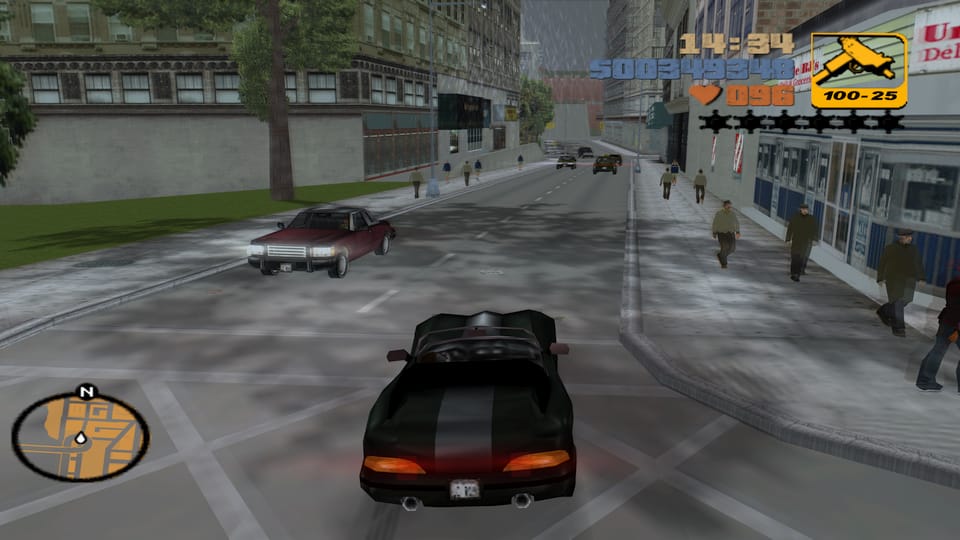
Until Dawn's deaths are taken seriously, but, like all good slasher films, there is a ridiculousness to the tragedy, an eye-roll-inducing impossibility that mimics the likes of the Resident Evil series. I may dismiss my bout of Sim-world megalomania as the actions of a child, and try to rationalize it, but the truth of the matter is I still find the antics hilarious – until they hit my personal threshold. These types of systems aid a player in exploring their darker impulses and discovering the points in which to stop. Often that point is mutable. To quote the king of hardcore violence himself, Quentin Tarantino, "Unless I'm paying to see some bizarro documentary, I'm not paying to see real death. Part of the way that this all works is that it's all just make-believe. That's why I can stand the violent scenes, cause we're all just f**king around."
Exploring moral systems
These aspects of morality serve both as entertainment and philosophical inquiries, where we can bend moral boundaries in the playground of fictional spaces. We don't mind the cruelty because no one gets hurt, and we understand this implicitly as being a game. It is where we funnel our curiosity. When we're kids our boundaries are a little more elastic and acute, but as we get older, we tend to moor ourselves to an identity, and with it a viewpoint based on experience and prior knowledge. This affects how we play games but doesn't always dictate the totality of our choices.
A 2021 study attempted to understand the dynamics of this by providing players various choices when going through a text-based narrative decision-making game, which would affect a "morality meter", and then collected their reactions and reasoning.
"Players do not always adopt a purely reflective or reactive approach to every choice. Sometimes they ignore the morality meter, sometimes they take it into account but do not necessarily follow it, and sometimes they simply follow it. Players can adopt a mix of reactive and reflective approaches depending on the type of decision at stake, the difficulty of the decision and the intuitiveness of the meter score for that choice. Some players followed the meter for less important decisions, whereas others found it more useful for harder decisions." – Morality Meters and Their Impacts on Moral Choices in Videogames: A Qualitative Study
The further conclusions of the study state that people tend to play by their own moral guide, not necessarily the manufactured binary of the game. This creates an interesting dynamic in games that rely solely on that binary – such as Bioshock, which infamously offers players the option to "harvest" (kill) the terrifying Little Sisters for a boost of "Adam", the game's equivalent to MP. Killing more than one locks you out of the "good" ending, but there's little nuance to the choice as compared to those of Detroit: Become Human, Until Dawn, or an RPG like Fable. In Bioshock, you choose to be merciful to so-called monsters or to benefit from killing them.
It is reminiscent of the situations presented in Until Dawn where they make unlikable characters plea rudely for their lives and so the game asks you, twice, if you really want to save them. Sometimes this is through what is seemingly a sacrifice. By asking players if they're willing to risk the downsides of being "good", especially in regard to characters that the narrative tries hard to initially paint as fearsome or irredeemable, you can either award or punish their behavior, challenge or reaffirm pre-existing biases.
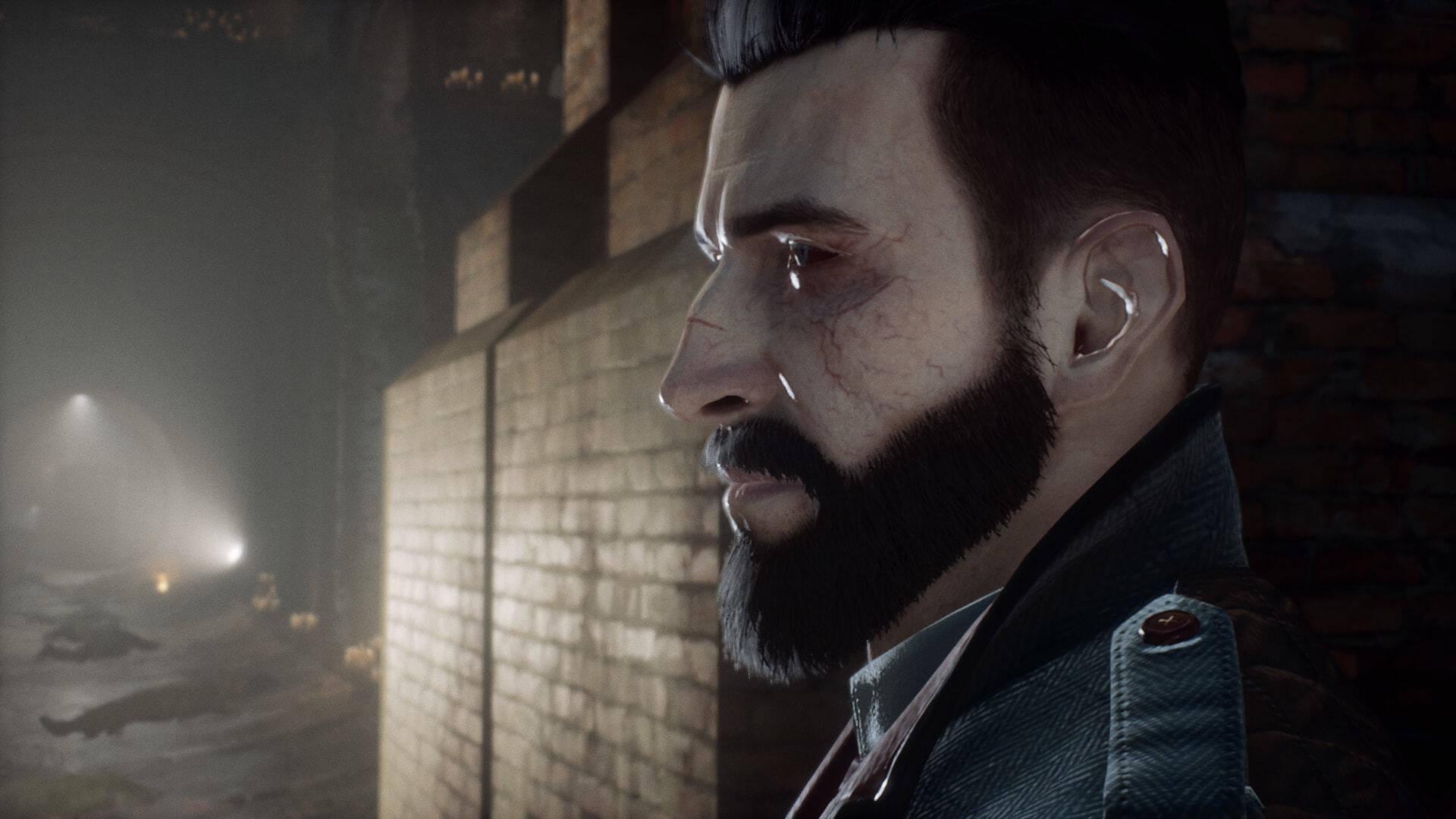
Occasionally in games, there are measurable downsides to choosing the more ethical pathway. Vampyr illustrates this much like Bioshock does – by rewarding vile acts with immediate gratification and better access to needed items (at least...initially). You simply run out of stuff less often. It can make the game easier, but it also complicates just how beneficial that bloodshed really is:
While the narrative arc involves [Vampyr protagonist] Mr. Reid looking for a cure, it is all but too late for him. Learning about the sixty some odd citizens you can feed on in the game is not about resisting the urge to feed. It’s about which one will benefit you the most while getting away with it. Gaining their trust is crucial, as per vampire lore one cannot enter a home without an invitation. Citizens who discover your true colors may turn on you, becoming an additional obstacle in your way. This is not a game about “the right thing to do.” While the developers were quick to point out that it is possible to complete the game without hurting a single citizen, they also stressed that it would be missing the point. Jonathan Reid is not a hero; he is a monster. – Vampyr’s Moral Compass Embraces Different Shades Of Tragedy [Paris Preview] by Matthew Utley
Games that rely on the "greyness" of a moral system lack the traditional binary of "good" or "evil." Even Until Dawn or Detroit: Become Human have staunchly "good" and "bad" endings, with a few that linger in between. It's in these stray conclusions that the cracks start to show because they don't always serve the purpose of the narrative in a way that pays off for everything that came before. Until Dawn avoids this by its relatively high stakes and genre trappings, but Detroit: Become Human involves "dead ends" for characters that make the entire story far less interesting. The narrative trumps the freedom of choice in a way that feels guided. In games that tailor the world to player action, such as those based on the rulesets of TTRPGs or even The Sims, where you roll (or select) for actions and have stats that rise or fall based on your decisions, the freedom is narrative.
But there are other games that use choice and its illusions as a narrative in and of itself. A much more serious example would be This War of Mine, which shows with profound accuracy what it really means to live in wartime as a civilian: the decisions that must be made, the sacrifices, the things you have to accept, and the horrible things you may have to do. There is no "morality meter" to implicate you as playing the "correct" or "morally right" way, as the point is not to play to win – it's to play to survive. The bleakness of the story is meant to induce hesitation, in that players try to win back a sense of control, but its truths remain hinged on uncomfortable realities.
"...ambiguity creates a dissonance, which begs the player to reflect on her actions in the game. This strategy arouses what Sicart (2009) referred to as the ethical agent within the player. As in real life, there are no rewards or punishment for everyday actions. The game rather presents the question “What would you do?” in this situation, given the difficulties that a civilian might encounter in war: [Dave, writer of This War of Mine says:] 'There are some situations in the game where you don’t have any good recourse. It’s just shit happens. You can just deal with it or sometimes die.'" – The Case of This War of Mine: A Production Studies Perspective on Moral Game Design
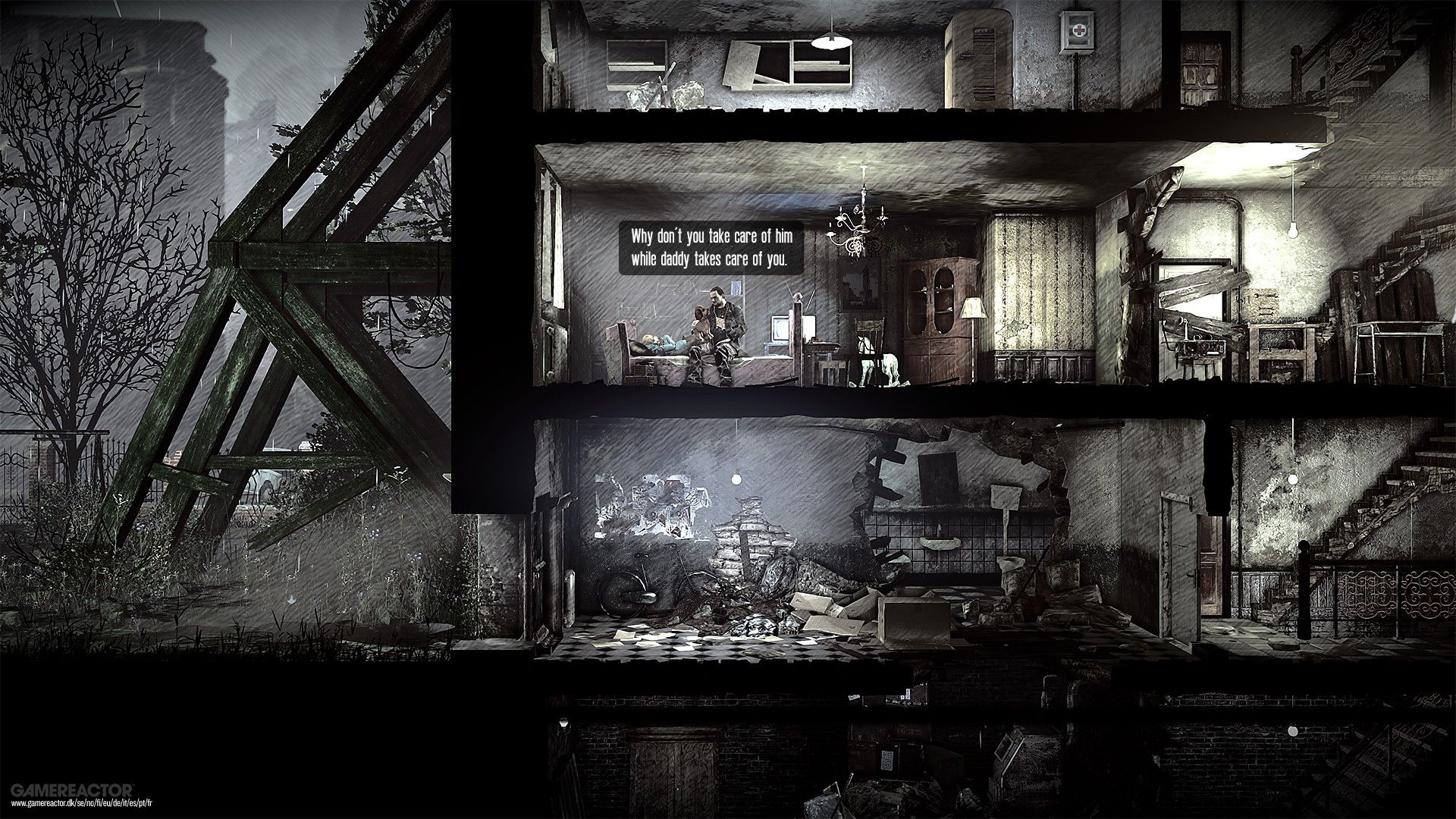
This War of Mine is a notoriously harsh game that's so effective at its depiction of war and the nuances of survival that it's become required reading in Polish schools. The choices the player-character makes are neither moral nor immoral in the game's measurement, but reliant entirely on personal player optimization of the situation. Who do you save or let die? The infirm? The sick? This "trolley problem" possibility gives no clear answer, and forces players to engage in a plot that isn't the comfortably fictitious experience of RPGs or other narrative-driven games. It is a moral challenge rooted in realism; it is an emotional reckoning. There is one particular sequence in the game that involves the player passing by the brutalization of another civilian by an armed and threatening soldier. We, the player-character, unarmed and scared, stand no chance against such an enemy. What could that interference cost? What of those who rely on us? What will become of them if we die? It echoes:
"What if we don't do anything?"
The guilt of agency – and why it's good
Whenever I find myself confronted with a decision in a game, my gut reaction is to go the sympathetic route. Why not? In Until Dawn, even after it's revealed that one of the characters is responsible for some pretty messed up stuff, I figured their degraded mental state should be cause for concern, not ostracization. My partner would lean towards the more chaotic choices to see just how far the game would let us go, and as a way to mix up the playstyles between us. This isn't only player responsibility – the design of it all is built into the game. It's a two-way looking glass. Devs provide us with the course, we simply test the parameters.
This sort of underlying but purposeful empathetic vein flickers throughout other games: should you have helped that shouting stranger in Red Dead Redemption 2? Why didn't you save that poor trapped dog in Resident Evil 4? Why would you want to be mean to Kim, your partner, in Disco Elysium? These games all offer varieties of choices, some of them more directly impacting the linear narrative (the dog in RE4 assists in a future boss fight) but others tailor the open world to player output.
We generally feel guilt over the decisions we make when they turn out to negatively affect the story, and most games try to elicit that sympathy by making kind choices a rewardable action. Most times, it doesn't need to be – an entire section of Until Dawn was dedicated to following a friendly wolf around an abandoned sanatorium, and it was the only time up to then I'd ever cheated on a choice. He'd only show up if you were previously nice to him, and if he followed you now, he could get hurt. I grabbed my phone, typed in "how to save dog until dawn", and repeated the steps. Another choice later in the game left another character dead because I made a split-second decision I should have understood, thanks to context clues, as being the wrong one. It hurt, and I turned away from the scene because as much as I love the horror, I still hate the gore, and I acutely felt the guilt.
You may laugh, but this is a thought that has been haunting me ever since. What other mistakes might I have made along the way in [Assassin's Creed] Valhalla without even realizing it? Why does making choices in video games distress me so much? Perhaps because, deep down, I know I can’t control the world, but I can control my game. – The Real Pleasure and Pain of Making Choices in Video Games by Swapna Krishna
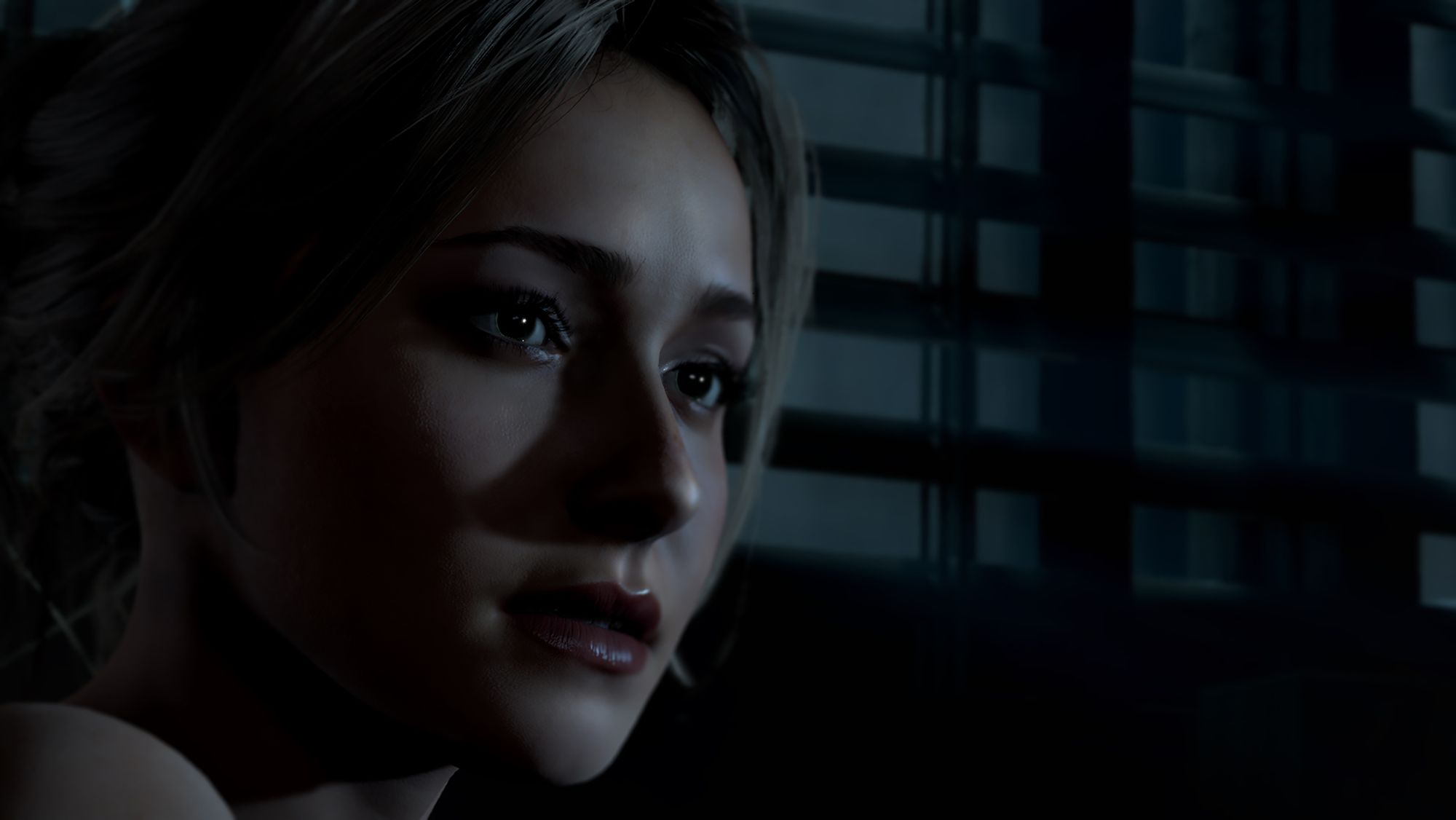
It is natural to want to help people, so games should, to some degree, follow this instinct. As we learn from them (even in the terrible treatment of Sims), these exercises of cost and care cushion us in the practice of limits. The guilt we feel over bad decisions is reminiscent of our own regrets or mistakes, and by exerting control on this narrative, we can wrestle it back or, for a game like This War of Mine, see if we're made of sterner stuff. In this little escape, we can choose better. Or, if we want, we can choose worse. Our first playthrough of Until Dawn ended in disaster for nearly all the characters over one single choice, and my partner and I watched the credits roll, clicked on chapter select, and did the whole final scene over.
This time they all got out.
